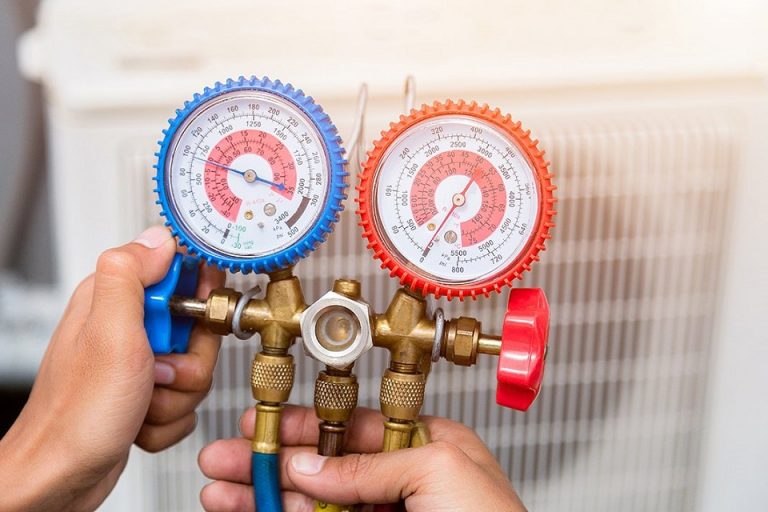The last thing you need to face in the comfort of your own home is an AC gas leak. Not only are they lethal, but they are also costly to repair if caught late. As an AC unit owner, experts at Anderson Air suggest you pay attention to the following signs:
#1: Warm Air Blowing Out Of Vents
If you get close to your ac vents and its lukewarm air blowing out of them, check to confirm/ensure that the thermostat is set to “AUTO” and not “FAN” because the fan setting lets air blow through your AC vents even when it is not in a cooling cycle.
Next, check to see if your air filter is clean. A dirty air filter limits your Ac unit from functioning correctly. After you carry out all these checks and warm air is still blowing from your vents, you could have an AC gas leak.
#2: Unfamiliar Sounds Like Hissing Or Bubbling
Sounds like bubbling or hissing from the refrigerant lines at the back of your outside condenser or your indoor air conditioner are signs to note. These are common signs of a coolant leak, which needs immediate attention.
Note: coolant is harmful to humans. Please be careful not to touch the coolant lines within your cooling system. Call your trusted technician right away, as they are the only ones skilled enough to handle the substance.
#3: Higher Humidity Levels
Your AC unit cools your home and dehumidifies it as well. Therefore if it fails to absorb heat from your home due to low coolant levels, it definitely won’t be able to remove humidity. So if you notice higher humidity than you’re accustomed to, reach out to a technician because you likely have a coolant leak.
#4: A Frozen Evaporator Coil
In the process of cooling, coolant goes through your internal evaporator coil to absorb heat from the indoor air that blows over the coil. Suppose the coolant in your cooling system is low. In that case, the coolant will not be enough to absorb all the heat, which leads to your evaporator coil freezing over. Freezing is a sign that your AC unit is leaking. Therefore you should contact a technician to assist you.
#5: Loss In Cooling Power
Coolant plays an essential role in the process of cooling. The coolant absorbs heat from your home and dissipates it outside. So if your coolant levels are low, cooling your home takes longer than usual. This is often a sign of an AC gas leak.
#6: Your Electric Bill Is High
When your AC coolant is leaking, it affects your comfort level, causing you to use more electricity as you dial down the thermostat hoping for cooler air. Revise your electricity bill for any spike in cost. If there are any, your AC unit is leaking.
#7: Corrosion Damaging The Evaporator Coil
Corrosion damage on the evaporator coil is another likely source of AC gas leakage. Pitting corrosion, precisely, happens when the evaporator coils get exposed to fluorides in the water supply and the chloride in detergents. Over time, when exposed to this corrosion, the evaporator coil will start to leak AC gas.
Formicary corrosion is another type of corrosion. Corrosion exposes the coils to formic or acetic acids for long periods. This exposure causes extensive damage to the evaporator coils, resulting in the coolant leaking.
#8: Schrader Valve damage
If the valve’s seal has some damage, it could leak coolant. A malfunctioning Schrader valve happens a lot and will lead to AC gas leaks.
#9: Damaged Coolant Lines
Air conditioners use the coolant lines to travel the coolant around the conditioning system. The coolant responsible for cooling the air goes from the outdoor condenser coils to the indoor evaporator coils. Coolant lines made of copper can incur extensive damage, allowing the coolant to leak through the cracks. The coolant can also spread within the system and lead to other parts of the air conditioning unit experiencing mechanical damage.
#10: Leaky Connections
A connection around the control valves could be leaking due to improper connections or lack of cleaning. If there are any poor connections, then the chance of an air conditioner gas leak is high.
Here’s Why Your AC Gas Is Leaking
There are various reasons why your AC gas is leaking. Here are some of the primary reasons why:
Poor Air Conditioner Installation
Licensed HVAC professionals should safely install air conditioners. If your HVAC service installs your air conditioner improperly, this will be the primary cause of future complications such as gas leaks.
If you notice any form of corrosion, contact an HVAC service immediately.
Poorly Soldered Control Valves & Faulty Joints
An AC gas leak can happen when the solder poorly melts, causing cold joints. Likewise, when an overheated or disturbed joint gets badly fixed or installed, this can easily lead to refrigerant leakages.
Little Or No Air Conditioner Servicing & Maintenance
Incorrect servicing of your air conditioner or limited maintenance checks could be another cause of AC gas leaks. Domestic air conditioners must get service at least once a year, while commercial air conditioners must get service once every six months. All this, however, depends on the type of unit installed.
Effects Of AC Gas Leaks
Gas leaks are harmful to human health. A gas-leaking air conditioner poses multiple health side effects to human beings. Some side effects are headaches and nausea.
CFCs absorb heat, and extended exposure to pressurized CFCs can lead to frostbite.
Short-term exposure to an AC gas leak leads to problems such as:
- Cracking of the skin
- Slower coordination
- Tremors
- Seizures
- An increased heart rate
Long term exposure to an AC gas leak can lead to critical medical conditions, for example:
- Difficulty breathing
- Loss of consciousness
- Cataracts in the eye.
- Skin cancer
- Asphyxiation.
Please dial 911 or visit the nearest hospital to get medical assistance if you experience any of the above symptoms.
Conclusion
HVAC gas leaks are harmful to your health. So, contact a trusted HVAC expert (Anderson Air) to repair your AC system immediately.



